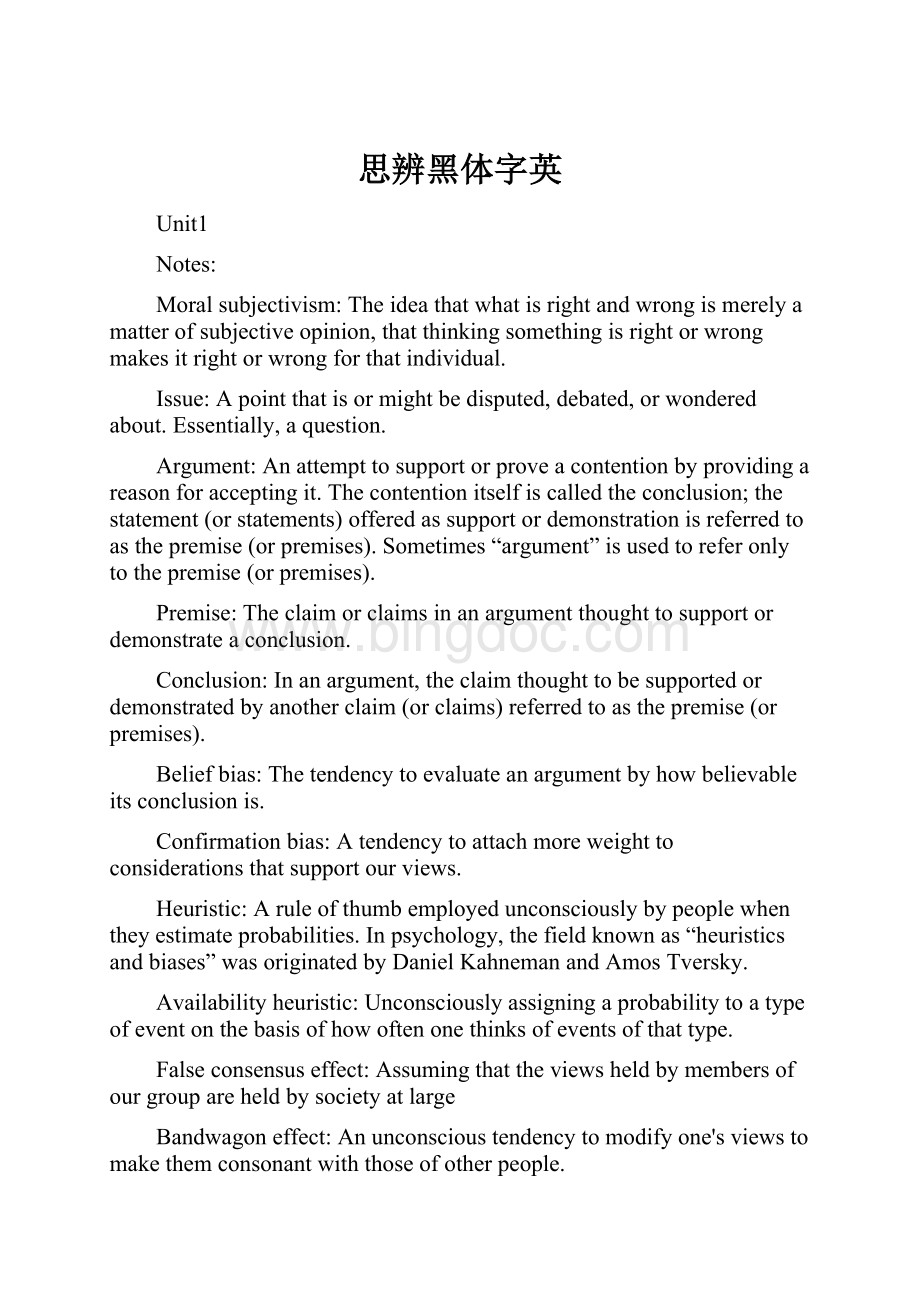思辨黑体字英.docx
《思辨黑体字英.docx》由会员分享,可在线阅读,更多相关《思辨黑体字英.docx(15页珍藏版)》请在冰点文库上搜索。

思辨黑体字英
Unit1
Notes:
Moralsubjectivism:
Theideathatwhatisrightandwrongismerelyamatterofsubjectiveopinion,thatthinkingsomethingisrightorwrongmakesitrightorwrongforthatindividual.
Issue:
Apointthatisormightbedisputed,debated,orwonderedabout.Essentially,aquestion.
Argument:
Anattempttosupportorproveacontentionbyprovidingareasonforacceptingit.Thecontentionitselfiscalledtheconclusion;thestatement(orstatements)offeredassupportordemonstrationisreferredtoasthepremise(orpremises).Sometimes“argument”isusedtoreferonlytothepremise(orpremises).
Premise:
Theclaimorclaimsinanargumentthoughttosupportordemonstrateaconclusion.
Conclusion:
Inanargument,theclaimthoughttobesupportedordemonstratedbyanotherclaim(orclaims)referredtoasthepremise(orpremises).
Beliefbias:
Thetendencytoevaluateanargumentbyhowbelievableitsconclusionis.
Confirmationbias:
Atendencytoattachmoreweighttoconsiderationsthatsupportourviews.
Heuristic:
Aruleofthumbemployedunconsciouslybypeoplewhentheyestimateprobabilities.Inpsychology,thefieldknownas“heuristicsandbiases”wasoriginatedbyDanielKahnemanandAmosTversky.
Availabilityheuristic:
Unconsciouslyassigningaprobabilitytoatypeofeventonthebasisofhowoftenonethinksofeventsofthattype.
Falseconsensuseffect:
Assumingthattheviewsheldbymembersofourgroupareheldbysocietyatlarge
Bandwagoneffect:
Anunconscioustendencytomodifyone'sviewstomakethemconsonantwiththoseofotherpeople.
Negativitybias:
Anunconscioustendencytogivemoreweighttonegativeevaluationsthantopositiveevaluations.
Lossaversion:
Beingmorestronglymotivatedtoavoidalossthantoaccrueagain.
In-groupbias:
Apredispositiontofindfaultwithoutsiders.
Fundamentalattributionerror:
Atendencytoattributethemistakesofmembersofthein-grouptoextenuatingcircumstances,whileattributingthesamemistakeswhenmadebymembersofout-groupstocharacterdefects
Obediencetoauthority:
Thetendencytocomplywithinstructionsfromanauthorityevenwhentheyconflictwithourvalues.
Overconfidenceeffect:
Atendencytooverestimatethepercentageofcorrectanswerswehavegiventoquestionsonasubjectwearenotexpertsabout.
Better-than-averageillusion:
Whenamajorityofagroupestimatestheyarebetteratsomethingthanamajorityofthegroup,thegroupissaidtobesubjecttothisillusion.Whenthemajorityofagroupestimatestheyareworseatsomethingthanamajorityofgroup,theyaresaidtobesubjecttothe“worsethanaverageillusion.”
Recap
Claim:
Whenabelief(judgment,opinion)isassertedinadeclarativesentence,theresultisaclaim,statement,orassertion.
•Objectiveclaimvs.subjectiveclaim:
Anobjectiveclaimistrueorfalseregardlessofwhetherpeoplethinkitistrueorfalse.Claimsthatlackthispropertyaresaidtobesubjective.
•“Factvs.opinion”:
Peoplesometimesrefertotrueobjectiveclaimsas“facts,”andusetheword“opinion”todesignateanyclaimthatissubjective.
•“Factualclaim”:
Anobjectiveclaim.Sayingthataclaimis“factual”isnotthesameassayingitistrue.Afactualclaimissimplyaclaimwhosetruthdoesnotdependonourthinkingitistrue.
•Moralsubjectivism:
Moralsubjectivismistheideathatmoraljudgmentsaresubjective.“Thereisnothingeithergoodorbadbutthatthinkingmakesitso.”
•Issue:
Aquestion.
•Argument:
Anargumentconsistsoftwoparts—onepartofwhich(thepremiseorpremises)isintendedtoprovideareasonforacceptingtheotherpart(theconclusion).
•“Argument”:
Peoplesometimesusethiswordtoreferjusttoanargument'spremise.
•Argumentsandissues:
Theconclusionofanargumentstatesapositionontheissueunderconsideration.
•Cognitivebias:
Afeatureofhumanpsychologythatskewsbeliefformation.Theonesdiscussedinthischapterincludethefollowing:
◇Beliefbias:
Evaluatingreasoningbyhowbelievableitsconclusionis.
◇Confirmationbias:
Atendencytoattachmoreweighttoconsiderationsthatsupportourviews.
◇Availabilityheuristic:
Assigningaprobabilitytoaneventbasedonhoweasilyorfrequentlyitisthoughtof.
◇Falseconsensuseffect:
Assumingouropinionsandthoseheldbypeoplearoundusaresharedbysocietyatlarge.
◇Bandwagoneffect:
Thetendencytoalignourbeliefswiththoseofotherpeople.
◇Negativitybias:
Attachingmoreweighttonegativeinformationthantopositiveinformation.
◇Lossaversion:
Beingmorestronglymotivatedtoavoidalossthantoaccrueagain.
◇In-groupbias:
Asetofcognitivebiasesthatmakeusviewpeoplewhobelongtoourgroupdifferentlyfrompeoplewhodon't.
◇Fundamentalattributionerror:
Havingoneunderstandingofthebehaviorofpeopleinthein-groupandanotherforpeoplenotinthein-group.
◇Obediencetoauthority:
Atendencytocomplywithinstructionsfromanauthority.
◇Overconfidenceeffect:
Acognitivebiasthatleadsustooverestimatewhatpercentageofouranswersonasubjectarecorrect.
◇Better-than-averageillusion:
Aself-deceptioncognitivebiasthatleadsustooverestimateourownabilitiesrelativetothoseofothers.
•Truth:
Aclaimistrueifitisfreefromerror.
•Knowledge:
Ifyoubelievesomething,haveanargumentbeyondareasonabledoubtthatitisso,andhavenoreasontothinkyouaremistaken,youcanclaimyouknowit.
Unit2
Notes:
Premise:
Theclaimorclaimsinanargumentthoughttosupportordemonstrateaconclusion.
Conclusion:
Inanargument,theclaimthoughttobesupportedordemonstratedbyanotherclaim(orclaims)referredtoasthepremise(orpremises).
Validargument:
Anargumentsuchthatitwouldbeself-contradictorytomaintainthattheconclusionisfalseandthepremise(orpremises)aretrue.
Soundargument:
Avalidargumentwhosepremisesaretrue
Stronger/weakerarguments:
Themorelikelythepremiseofaninductiveargumentmakestheconclusion,thestrongertheargument,andthelesslikelyitmakestheconclusion,theweakertheargument.
Balanceofconsiderationsreasoning:
Tryingtodeterminewhichconsiderations,bothforandagainstthinkingordoingsomething,carrythemostweight.
InferencetotheBestExplanation(IBE):
Anargumentwhoseconclusionstatesthemostlikelycauseofsomething.
Recap
Argumentsalwayshavetwoparts,apremise(orpremises)andaconclusion.
Thesamestatementcanbeapremiseinoneargumentandaconclusioninasecondargument.
Thetwofundamentaltypesofreasoningaredeductivedemonstrationandinductivesupport.
Adeductiveargumentisusedtodemonstrateorproveaconclusion,whichitdoesifitissound.
Anargumentissoundifitisvalidanditspremise(orpremises)istrue.
Anargumentisvalidifitisn'tpossibleforitspremiseorpremisestobetrueanditsconclusiontobefalse.
Aninductiveargumentisusedtosupportratherthantodemonstrateaconclusion.
Anargumentsupportsaconclusionifitincreasesthelikelihoodthattheconclusionistrue.
Supportisamatterofdegrees:
Anargumentsupportsaconclusiontotheextentitspremise(orpremises)makestheconclusionlikely.
Anargumentthatoffersmoresupportforaconclusionissaidtobestrongerthanonethatofferslesssupport;thelatterissaidtobeweakerthantheformer.
Someinstructorsusetheword“strong”inanabsolutesensetodenoteinductiveargumentswhosepremise(orpremises)makestheconclusionmorelikelythannot.
Ifitdoesn'tmakesensetothinkofanargumentasprovidingevidenceorsupportforacontention,itisprobablybecauseitisadeductiveargument.
Inductiveargumentsanddeductiveargumentscanhaveunstatedpremises.
Whetheranargumentisdeductiveorinductivemaydependonwhattheunstatedpremiseissaidtobe.
Ifanargumentiswritten,diagrammingitmayhelpyouunderstandit.
Balanceofconsiderationsreasoningofteninvolvesdeductiveandinductiveelements.
Inferencetobestexplanationisacommontypeofinductivereasoninginwhichtheconclusionexplainsthecauseofsomething.
Unit3
Notes:
Vagueness:
Aconceptisvagueifwecannotsaywithcertaintywhatitincludesandwhatitexcludes.
Ambiguity:
Havingmorethanonemeaning.Anambiguousclaimisonethatcanbeinterpretedinmorethanonewayandwhosemeaningisnotmadeclearbythecontext.SeealsoSemanticambiguity;Syntacticambiguity.
Groupingambiguity:
Akindofsemanticambiguityinwhichitisunclearwhetheraclaimreferstoagroupofthingstakenindividuallyorcollectively
.Ambiguouspronounreference:
Astatementorphraseinwhichitisnotcleartowhatortowhomapronounissupposedtorefer.
Generality:
Lackofdetailorspecificity.ThemoredifferentkindsofXstowhichthewordforXsapplies,themoregeneralthatwordis.
Precisingdefinition:
Adefinitionwhosepurposeistoreducevaguenessorgeneralityortoeliminateambiguity.
Stipulativedefinition:
Adefinition(ofaword)thatisspecifictoaparticularcontext.
Rhetoricaldefinition:
Apseudo-definitiongiventoexpressourfeelingsorinfluencesomeoneelse's.
Emotivemeaning:
Thepositiveornegativeassociationsofanexpression;anexpression'srhetoricalforce.
Rhetoricalforce:
SeeEmotivemeani
Definitionbyexample:
Pointingto,naming,orotherwiseidentifyingoneormoreexamplesofthetermbeingdefined;alsocalledostensivedefinition.
Ostensivedefinition:
SeeDefinitionbyexample.
Definitionbysynonym:
Givinganotherwordorphrasethatmeansthesamethingasthetermbeingdefined.
Analyticaldefinition:
Specificationofthefeaturesathingmustpossessinorderforthetermbeingdefinedtoapplytoit.